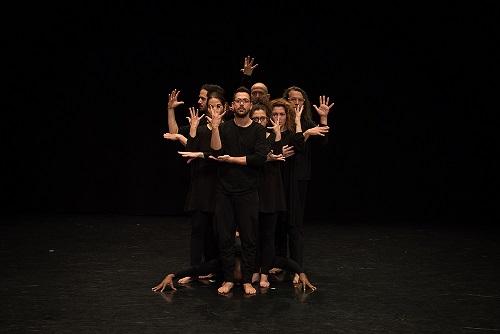Ebisu Sign Language Theatre Laboratory will be accessible to an audience ages 13 and older. A combination of Israeli Sign Language, expressive gestures and physical theatre will intrigue audiences throughout a free performance of the Ebisu Sign Language Theatre Laboratory, 7 p.m. Wednesday, Sept. 28, in Panara Theatre on the Rochester Institute of Technology campus. The performance—which coincides with the celebration of Rochester Deaf Awareness Week—is sponsored by RIT’s National Technical Institute for the Deaf, the Jewish Federation of Greater Rochester and the Jewish Community Center of Rochester.

Ebisu Sign Language Theatre Laboratory will perform at RIT/NTID Sept. 28. Credit: Yair Meyuhas.
The performance—free and open to the public—is suitable for both deaf and hearing audiences ages 13 and older. According to show producers, the nature of the movements and themes in the production make for clear understanding of what is happening on stage without the need for interpreters.
Ebisu Sign Language Theatre Laboratory began in 2014 as part of the Grammar of the Body (GRAMBY) Research Project led by Wendy Sandler, linguistics professor at the University of Haifa, Israel. Most of the eight actors are deaf or hard of hearing, and all use Israeli Sign Language (ISL) daily. Atay Citron, director of Ebisu, is associate professor in the theatre department at University of Haifa.
Named after the Japanese god Ebisu, who, according to the group, is the only deaf god in world religions and mythologies, the group highlights facial expressions and body language in their work and experiments with gestures that normally are performed and understood by hearing and deaf people alike. The theatrical material is not based on written texts; it is the product of improvisation, and the result is poetic, humorous and physical.
According to the group, Rochester’s large deaf and hard-of-hearing population prompted their visit to the city, which follows performances in the greater New York City region.
“We had learned of the Ebisu group through an RIT/NTID alumnus who had seen them in Israel and highly recommended them,” said Aaron Kelstone of RIT/NTID’s Cultural and Creative Studies Department. “It made sense to try and get them to campus so that our students and the Rochester community could experience another form of deaf and hearing artistic expression.”
In addition to the Rochester sponsors, Ebisu’s U.S. tour is supported by Israel’s Ministry of Foreign Affairs, the Culture and Arts Council of Mifal Hapais (Israeli Lottery), and the University of Haifa. Their work is part of The Grammar of the Body Research Project that is supported by a grant from The European Research Council.
About Rochester Institute of Technology
Rochester Institute of Technology is home to leading creators, entrepreneurs, innovators and researchers. Founded in 1829, RIT enrolls about 19,000 students in more than 200 career-oriented and professional programs, making it among the largest private universities in the U.S.
The university is internationally recognized and ranked for academic leadership in business, computing, engineering, imaging science, liberal arts, sustainability, and fine and applied arts. RIT also offers unparalleled support services for deaf and hard-of-hearing students. The cooperative education program is one of the oldest and largest in the nation. Global partnerships include campuses in China, Croatia, Dubai and Kosovo.
For news, photos and videos, go to www.rit.edu/news.

